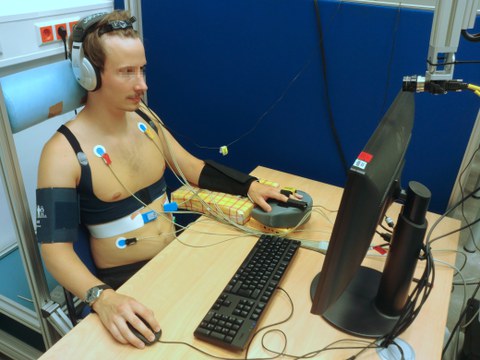Oct 18, 2021
Data collection for stress-camera study completed
Data collection for the stress-camera study has been completed. A total of 65 subjects participated in the study and completed the "Mannheim Multicomponent Stress Test" (Kolotylova et al., 2010). Meanwhile, an industrial camera filmed the face to draw conclusions about blood flow in the skin. In addition, numerous reference signals were recorded synchronously in time (electrocardiogram, photoplethysmograms, intermittent and continuous blood pressure, chest expansion, electrical skin conductivity). With nearly 20 million uncompressed images and approximately 17 TB of data, one of the most comprehensive databases for camera-based photoplethysmography in the world was created (Antink et al., 2019). Data collection occurred over a 19-month period and had to be interrupted several times due to the COVID-19 pandemic. The aim of the study is to characterize the non-contact detection of stress based on physiological parameters.
Stress, as it arises from uncontrollable situations, inhibits the prefrontal cortex (Amat et al., 2008) and thus cognitive performance. Moreover, prolonged stress without appropriate recovery periods is detrimental to health (Rozanski et al., 2005). In cyber-physical production systems, contextual information about the operator's state can be used, for example, to redistribute tasks for relief or to adapt operator interfaces.
References
Amat, J., Paul, E., Watkins, L. R., & Maier, S. F. (2008). Activation of the ventral medial prefrontal cortex during an uncontrollable stressor reproduces both the immediate and long-term protective effects of behavioral control. Neuroscience, 154(4), 1178–1186. https://doi.org/10.1016/j.neuroscience.2008.04.005
Antink, C. H., Lyra, S., Paul, M., Yu, X., & Leonhardt, S. (2019). A Broader Look: Camera-Based Vital Sign Estimation across the Spectrum. Yearbook of Medical Informatics, 28(01), 102–114. https://doi.org/10.1055/s-0039-1677914
Kolotylova, T., Koschke, M., Bär, K.-J., Ebner-Priemer, U., Kleindienst, N., Bohus, M., & Schmahl, C. (2010). Entwicklung des „Mannheimer Multikomponenten-Stress-Test” (MMST). PPmP - Psychotherapie · Psychosomatik · Medizinische Psychologie, 60(02), 64–72. https://doi.org/10.1055/s-0028-1103297
Rozanski, A., Blumenthal, J. A., Davidson, K. W., Saab, P. G., & Kubzansky, L. (2005). The epidemiology, pathophysiology, and management of psychosocial risk factors in cardiac practice. Journal of the American College of Cardiology, 45(5), 637–651. https://doi.org/10.1016/j.jacc.2004.12.005

